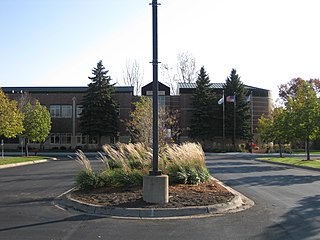Related Research Articles

Cottage Grove is a city 10 miles (16 km) south of Saint Paul in Washington County in the State of Minnesota. It lies on the north bank of the Mississippi River, north of the confluence with the St. Croix River. Cottage Grove and nearby suburbs form the southeast portion of Minneapolis-Saint Paul, the 16th-largest metropolitan area in the United States, with about 3.69 million residents. Its population was 38,839 at the 2020 census.

Woodbury is a city in Washington County, Minnesota, United States, eight miles east of Saint Paul along Interstate 94. It is part of the Minneapolis–Saint Paul metropolitan area. The population was 75,102 at the 2020 census, making it Minnesota's eighth most populous city.

The Star Tribune is the largest newspaper in Minnesota. It originated as the Minneapolis Tribune in 1867 and the competing Minneapolis Daily Star in 1920. During the 1930s and 1940s, Minneapolis's competing newspapers were consolidated, with the Tribune published in the morning and the Star in the evening. They merged in 1982, creating the Star and Tribune, and it was renamed to Star Tribune in 1987. After a tumultuous period in which the newspaper was sold and re-sold and filed for bankruptcy protection in 2009, it was purchased by local businessman Glen Taylor in 2014.
Metro Transit is the primary public transportation operator in the Minneapolis–Saint Paul area of the U.S. state of Minnesota and the largest operator in the state. Although Metro Transit is one of the smallest transit systems for a large metropolitan area in the United States, it has previously been ranked as one of the best. In 2022, the system had a ridership of 38,794,700, or about 124,600 per weekday as of the fourth quarter of 2022.

Whittier is a neighborhood within the Powderhorn community in the U.S. city of Minneapolis, Minnesota, bounded by Franklin Avenue on the north, Interstate 35W on the east, Lake Street on the south, and Lyndale Avenue on the west. It is known for its many diverse restaurants, coffee shops and Asian markets, especially along Nicollet Avenue. The neighborhood is home to the Minneapolis Institute of Art, the Minneapolis College of Art and Design, and the Children's Theatre Company.

Circus Juventas is a youth performing arts circus school located in Saint Paul, Minnesota, serving youth throughout the Minneapolis–Saint Paul metropolitan area. The organization was founded in 1994 by Dan and Betty Butler, and offers circus arts training to young people ranging from 3 to 21 years old.

Michael Alan Hatch is an American politician and lawyer. He was the Attorney General of Minnesota from 1999 to 2007, commissioner of the Minnesota Department of Commerce from 1983 to 1989, and chair of the Minnesota DFL Party from 1980 to 1983.

Minnehaha Academy is a Christian private school in Minneapolis, Minnesota, United States, for students in preschool through 12th grade, and established in 1913. There are two campuses, the South Campus for preschool through 8th graders, and the North Campus, for 9th through 12th graders. It is a ministry of the Northwest Conference of the Evangelical Covenant Church, and is located in the Cooper and Hiawatha neighborhoods on West River Parkway. The student body is drawn from Minneapolis, St. Paul, and throughout the Minneapolis–Saint Paul metropolitan area, as well as several international students.

The Mississippi National River and Recreation Area is a 72-mile (116 km) and 54,000-acre (22,000 ha) protected corridor along the Mississippi River through the Minneapolis–Saint Paul metro in the U.S. state of Minnesota, from the cities of Dayton and Ramsey, to just downstream of Hastings. This stretch of the upper Mississippi River includes natural, historical, recreational, cultural, scenic, scientific, and economic resources of national significance. This area is the only national park site dedicated exclusively to the Mississippi River. The Mississippi National River and Recreation Area is sometimes abbreviated as MNRRA or MISS, the four letter code assigned to the area by the National Park Service. The Mississippi National River and Recreation Area is classified as one of four national rivers in the United States, and despite its name it is technically not one of the 40 national recreation areas.

Steve Heitzeg is an American composer whose works include compositions for orchestra, chorus, chamber ensemble, ballet, and film.

The Minnesota Valley Transit Authority, also known by the acronym MVTA, is a public transportation agency that serves seven communities in the southern portion of the Minneapolis–Saint Paul metropolitan area. The agency provides fixed-route and demand-responsive transit within the service area of the communities and to select destinations in the region.

The Avery Coonley School (ACS), commonly called Avery Coonley, is an independent, coeducational day school serving academically gifted students in preschool through eighth grade (approximately ages 3 to 14), and is located in Downers Grove, DuPage County, Illinois. The school was founded in 1906 to promote the progressive educational theories developed by John Dewey and other turn-of-the-20th-century philosophers, and was a nationally recognized model for progressive education well into the 1940s. From 1943 to 1965, Avery Coonley was part of the National College of Education (now National Louis University), serving as a living laboratory for teacher training and educational research. In the 1960s, ACS became a regional research center and a leadership hub for independent schools, and began to focus on the education of the gifted.
Pioneers Park Nature Center, established in 1963, is a 668-acre (2.70 km2) nature preserve located within Pioneers Park, which is located at the intersections of South Coddington and West Van Dorn Streets in Lincoln, Nebraska. Both Pioneers Park and the Nature Center within it are operated by the Lincoln Parks and Recreation Department.

Saint Paul, Minnesota is noted for its neighborhoods. The city has been called "fifteen small towns with one mayor", owing to the neighborhood-based life of much of the city. Saint Paul is partially governed by not 15 but 17 City Districts.
Olivia Irvine Dodge was a philanthropist who, along with her sister Clotilde Irvine Moles, donated the house that is now the Minnesota Governor's Residence.

The Red Tail Squadron, part of the non-profit Commemorative Air Force (CAF), known as the Red Tail Project until June 2011, maintains and flies a World War II era North American P-51C Mustang. The twice-restored aircraft flies to create interest in the history and accomplishments of the members of the World War II-era 332nd Fighter Group, also known as the Tuskegee Airmen, whose distinctive red markings on the tails of the P-51s they flew during that war, gave the organization its name.

Irvine Nature Center is a nature center in Owings Mills, Maryland. The center, which is set on 210 acres (0.85 km2) of land in the Caves Valley Historic District, includes a 17,200-square-foot (1,600 m2) green exhibit hall, classrooms, outdoor classroom, a Native American Education site, amphitheater and 8+ miles trails. Irvine is home to the Nature Preschool and Earth Friends Homeschool. Irvine has 80,000 visitors a year.

Herman Henry Kohlsaat was an American businessman and newspaper publisher.
Kent Michael Nerburn is an American author. He has published 16 books of creative non-fiction and essays, focusing on Native American and American culture and general spirituality. He won a Minnesota Book Award in 1995 for Neither Wolf Nor Dog and again in 2010 for The Wolf At Twilight. The Girl who Sang to the Buffalo, is the final book in this trilogy.
Punchinello Players, founded in 1914, was a theatre organization of the University of Minnesota. When it closed it was the second oldest student-run community theater in the U.S. Punchinello - located on the St. Paul campus - originated for the purpose of improving the lives of the greater community. As a university-associated theater it changed with the times and continued to explore and interrogate the human condition. Punchinello Players closed in 1994 due primarily to its home, North Hall, being slated for demolition.
References
- 1 2 3 Ferraro, Nick (October 9, 2017). "Dodge Nature Center captures its history, honors its founder with renovated farmhouse". St. Paul Pioneer Press . Retrieved May 25, 2019.
- 1 2 Kimball, Joe (February 9, 1998). "A field trip on the trail of nature". StarTribune. p. B1, B5.
- ↑ Peterson, George (December 14, 1975). "a farm on the prairie". Minneapolis Tribune. p. 11F.
- 1 2 3 Kimball, Joe (May 18, 2001). "Around St. Paul: Donor hopes Dodge preserve will inspire love of nature". StarTribune. p. B1, B3.
- ↑ Kern, Ben (April 5, 1981). "'Ma Nature's call brings more folks to centers'". Minneapolis Tribune . p. 13C, 14C.
- 1 2 Mundt, Diane (December 22, 1988). "Volunteers benefit by teaching kids, Dodge Nature Center depends on retiree staff'". Star Tribune . p. S3.
- ↑ Crum, William (May 6, 2012). "Every day a field trip at Garlough". Star Tribune .
- ↑ Ferraro, Nick (September 3, 2013). "Cottage Grove homestead donated to Dodge Nature Center". St. Paul Pioneer Press . Retrieved May 25, 2019.
- ↑ Rolfsmeier, Liz (July 12, 2015). "Nature shares the stage – The outdoor concert series at Dodge Nature Center features music, drama and the occasional deer". Star Tribune .
- ↑ Pinson, Ginger (January 30, 2017). "' Dodge Nature Center: 50 years of celebrating the great outdoors". St. Paul Pioneer Press . Retrieved May 25, 2019.
- ↑ Guthrey, Molly (February 2, 2017). "' Daily Juggle: Happy Birthday to my back yard, Dodge Nature Center". St. Paul Pioneer Press . Retrieved May 25, 2019.
- ↑ Nelson, Katie (April 5, 2017). "Big changes afoot at Shepard farm in Cottage Grove". South Washington County Bulletin. Retrieved May 25, 2019.
- ↑ Pfister, Darlene (September 26, 2000). "Kids learn from all things natural at school". StarTribune. p. B1, B8.